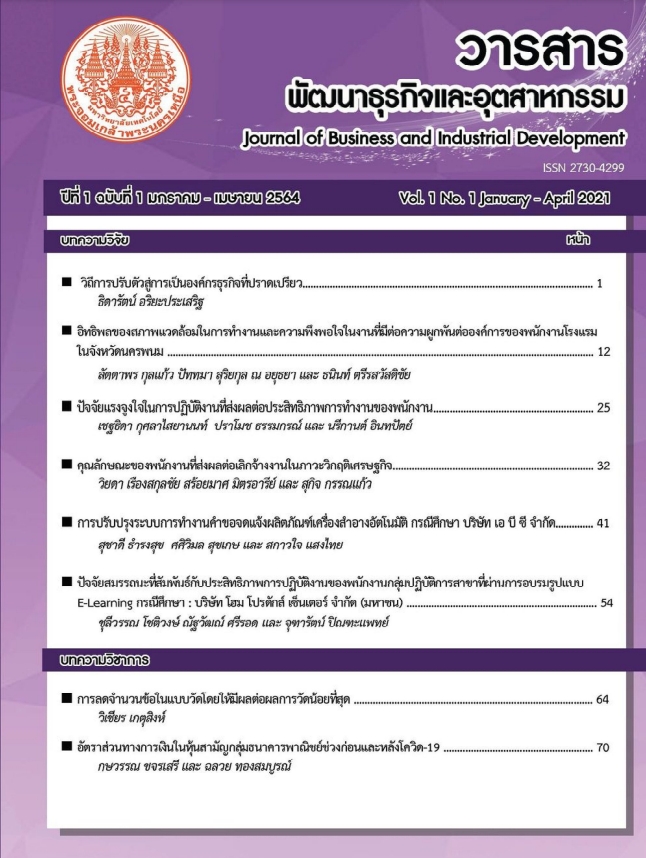Transformation Pathway towards an Agile Industrial Business Organization in the Era of Economic Disruption
Abstract
This article is a report of a qualitative research study from documentary reviews and in-depth interviews with the group of experts. The main objective was to examine a guideline model for organizational management to become agile, with adaptability and flexibility to changing circumstances in the age of economic disruption. This is the era when digital technology seems to have an influence on security, safety and stability of companies and organizations. The content analysis revealed 3 key factors affecting an approach to achieve organizational agility, namely, Factor 1: Organizational Environment toward Uncertainty and Ambiguity, consisting of 2 sub-elements: 1. External environment including 1.1) Industrial and business context, 1.2) Financial and ownership structure, 1.3) Market competitive position, 1.4) Brand values and 1.5) Past effective performance. 2. Internal environment, comprising 2.1) Organizational culture, 2.2) Risk management attitude, 2.3) Perception of power support, and 2.4) Leadership. Factor 2: Sustainable and Flexibility factor with 3 sub-factors: 2.1) Mobility, 2.2) Empowerment and 2.3) Decision making. Factor 3: Agile Leader Characteristics constitutes 3 sub-factors: 3.1) Holistic awareness, 3.2) Data acquisition for decision making, and 3.3) Active operation.
References
Anthony, S. D. (2016, February 29). “What do you really mean by Business Transformation”. Harvard Business Review. https:// hbr.org/2016/02/what-do-you-really-mean-by-business-transformation
Diamandis, P. (2017, June 19). “Exponential Roadmap”. HuffPost News. https://.www.huffpost.com/entry/exponentialroadmaps_b_59481f16e4b0961faacbe5c3
Ramirez, V.B. (2016, November 22). “The 6 Ds of Tech Disruption: A Guide to the Digital Economy.” . Singularity Education Group. https://singularityhub.com/2016/11/22/the-6-ds-of-tech-disruption-a-guide-to-the-digital-economy/
Aghina, W. et al. (2018, January 22). “The Five Trademarks of Agile Organizations.”. McKinsey & Company. https://www.mckinsey.com/business-functions/organization/our-insights/the-five-trademarks-of-agile-organizations
Syrett, M. and M. Devine. (2012). Managing Uncertainty Strategies for Surviving and Thriving in Turbulent Times. (6th ed.). Wiley.
EYQ. (2016). “The upside of disruption Megatrends shaping 2016 and beyond.”. EYGM Limited. https://www.ey.com/Publication/vwLUAssets/EY-the-upside-of-disruption/$FILE/EY-theupside-of-disruption.pdf
Samkoset, W. (2016, November 22). “Get to know Disruptive Technologies.”. Krungthepthurakij. https://www.bangkokbiznews.com/blog/detail/639505
De Meyer, A.C.L. Loch C.H. and Pich, M.T. (2002). “Managing project uncertainty: From variation to chaos.”. MIT Sloan Management Review. 43(2). 60-67.
Courtney, H. Kirkland, J. and Viguerie, P. (1997). “Strategy Under Uncertainty”. Harvard Business Review. https://hbr.org/1997/11/strategy-under-uncertainty
Economist Intelligence Unit. (2009). “Organisational Agility.”. The Economist. https://www.emc.com/collateral/leadership/organisational-agility-230309.pdf
Woolf, A. and Tabernor, J. (2018, August 14). “Enterprise agility in financial services.” and “Exponential Roadmaps.”. Accenture. https://www.accenture.com/us-en/insights/financial-services/enterprise-agility
Press, J. & Goh, T. (2018). “Leadership, disrupted: How to Prepare Yourself to Lead in a Disruptive World.” Center for Creative Leadership. https://www.ccl.org/wp-content/uploads/2018/01/Leadership-Disrupted-White-Paper.pdf
ธิดารัตน์ อริยะประเสริฐ, สุภัททา ปิณฑะแพทย์, และธีรวุฒิ บุณยโสภณ. (2561). การพัฒนารูปแบบการจัดการองค์กรสำหรับธุรกิจอุตสาหกรรมไทยในยุคเศรษฐกิจพลิกผัน. วารสารวิชาการพระจอมเกล้าพระนครเหนือ, 30(2), 314-323
อำนวย อภิชัยนันท์. (2559). รูปแบบการพัฒนาภาวะผู้นำตามการเปลี่ยนแปลงของโลกธุรกิจเพื่อการเติบโตอย่างยั่งยืนในองค์กรวิสาหกิจขนาดกลางและขนาดย่อม (SMEs). [วิทยานิพนธ์ปริญญาดุษฎีบัณฑิต]. มหาวิทยาลัยเทคโนโลยีพระจอมเกล้า
พระนครเหนือ.
Downloads
Published
How to Cite
Issue
Section
License
Copyright (c) 2023 Journal of Business and Industrial Development

This work is licensed under a Creative Commons Attribution-NonCommercial-NoDerivatives 4.0 International License.





